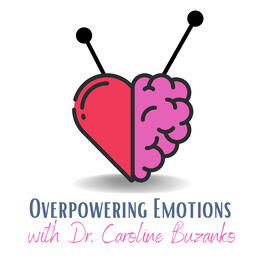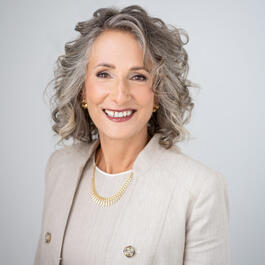
Overpowering Emotions: Tools for Child & Teen Anxiety and Resilience
Practical, science-based strategies to help kids and teens manage anxiety, navigate big feelings, and build resilience. Overpowering Emotions is the #1 resource for adults who want to confidently support children and teens through emotional challenges. Children and teens today are struggling with more anxiety, overwhelm, and emotional intensity than ever before—and adults are desperate for tools that actually work. This podcast is here to change that. Dr. Caroline gives you the knowledge and tools you need to support children and teens through anxiety, emotional overwhelm, and everyday challenges. Whether you’re a parent, educator, clinician, or caregiver, you’ll learn exactly what to do (and what not to do) right away to help young people feel calmer, braver, and more capable. Each episode delivers: • Clear, practical steps you can use immediately • Expert interviews with leading psychologists and researchers • Real-life examples that make complex concepts easy to understand • Tools for emotional regulation, anxiety mastery, confidence-building, and resilience • Effective approaches for home, school, and clinical settings If you’ve ever wished for a trusted guide to help you navigate child and teen anxiety, emotional outbursts, and overwhelming emotions, you’ve just found it. Subscribe now and join the movement to help the next generation thrive. About Dr. Caroline Buzanko Dr. Caroline is a psychologist, researcher, speaker, and internationally recognized expert in child and teen anxiety. With more than 25 years of experience supporting children, teens, and families, she is known for her ability to translate cutting-edge research into practical, compassionate strategies that make a meaningful impact. In 2024, Dr. Caroline was honoured as Alberta’s Psychologist of the Year, a recognition that reflects her significant contributions to advancing child and youth mental health practices. Often called the “Yoda of anxiety,” she blends scientific evidence, clinical expertise, and real-world tools to help young people build confidence, emotional regulation, and lifelong resilience.
Show episodes

219. Overstimulated, Overwhelmed, and Over It: Emotion Regulation During the Holidays
The holidays are supposed to be joyful—but for many families, they quietly amplify stress, overwhelm, and emotional reactivity. In this special crossover episode with Parents of the Year podcast, Dr. Caroline and her husband Andrew step away from “perfect holiday” pressure and take a psychologically grounded look at wh
Big feelings don’t always need more rules and structure. Sometimes they need play, movement, and a bit of silliness. In this episode of Overpowering Emotions, Dr. Caroline is joined by Sifu Boggy (Paul Brighton), a Taoist teacher who blends Qigong, Tai Chi, humour, and “sacred child” energy to support healing. They tal

217. How do kids learn to regulate emotions? Turning big feelings into smart choices.
Big feelings are not the problem. The real issue is when kids don’t know what those feelings are for or what to do with them. In this episode of Overpowering Emotions, Dr. Caroline walks through how to help children and teens move from “I feel awful” to “Here’s what I need and here’s what I’m going to do.” You’ll hear
Kids say “I feel bad” all the time. But what does that actually mean for their brain and their behaviour? In this episode of Overpowering Emotions, Dr. Caroline breaks down how the brain builds emotions and why teaching kids to move from “I feel bad” to “I feel overwhelmed / uncertain / left out” is a game-changer fo
This week, Dr. Caroline unpacks one of the most misunderstood parts of emotion regulation: Why avoidance keeps anxiety alive and how real-world experience rewires the emotional brain. She explains how children’s brains constantly make predictions about safety, danger, and comfort and how avoidance traps them in cycle
How do kids learn to think about their emotions instead of being swept away by them? In this episode, Dr. Caroline breaks down strategic emotion management, helping children and teens build emotional metacognition, the ability to reflect on and make sense of what they feel. You’ll learn how to guide kids to pause, ques
